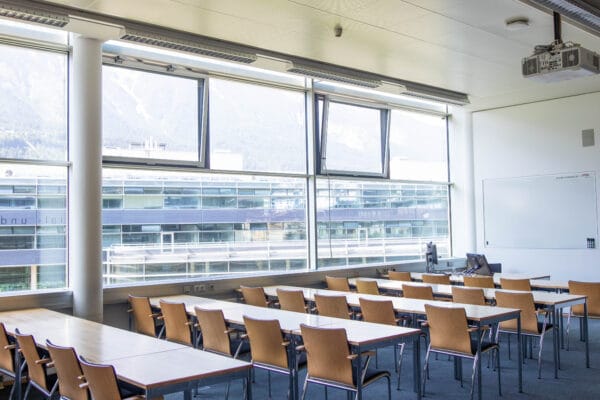
NAME:
MCI - SR 303
BUILDING:
Management Center Innsbruck
FLOOR:
3
TYPE:
Seminar Room
CAPACITY:
54
ACCESS:
Only Participants
EQUIPMENT:
Beamer, Handicapped Accessible, PC, Sound System, Whiteboard, WLAN (Eduroam), Microphones
This paper examines the role of interdisciplinary approaches in studying oral traditions and history, using the case study of Jebli Moroccan villages. The term Jebli refers to people from the mountains, and this study underscores the need for diverse perspectives and collaboration across disciplines to gain a comprehensive understanding of the complex issues faced by these villages. It advocates for methodologies that challenge dominant narratives, integrating knowledge from fields such as cross-cultural studies, anthropology, and ethnomusicology. By incorporating oral narratives, researchers can question and substantiate written historical records, offering a more democratic treatment of people’s experiences.
The research emphasizes the importance of contextualizing findings within specific social, cultural, and historical settings, encouraging scholars to consider the academic and cultural peculiarities of the subject matter. For instance, the analysis of Jebli oral traditions benefits from combining cross-cultural studies, anthropology, and ethnology, allowing for a deeper understanding of cultural preservation and the transmission of history. Additionally, studying the oral traditions of the Jebli people offers valuable insights into their socio-economic development and challenges. These narratives provide a window into the struggles and resilience of Jebli communities as they navigate economic and social transformations, shedding light on their adaptation to modernity and ongoing challenges.
Interdisciplinary research fosters the development of innovative methodologies that transcend traditional disciplinary boundaries. For example, the study employs ethnomusicology to examine Jebli chants and songs, blending research with action to promote cultural rights.
Ultimately, the future of interdisciplinary research lies in its ability to foster comprehensive understanding, challenge conventional narratives, develop innovative methodologies, and emphasize contextualization. This approach will contribute to a more nuanced and democratic framework for historical and cultural studies.

We and use cookies and other tracking technologies to improve your experience on our website. We may store and/or access information on a device and process personal data, such as your IP address and browsing data, for personalised advertising and content, advertising and content measurement, audience research and services development. Additionally, we may utilize precise geolocation data and identification through device scanning.
Please note that your consent will be valid across all our subdomains. You can change or withdraw your consent at any time by clicking the “Consent Preferences” button at the bottom of your screen. We respect your choices and are committed to providing you with a transparent and secure browsing experience.